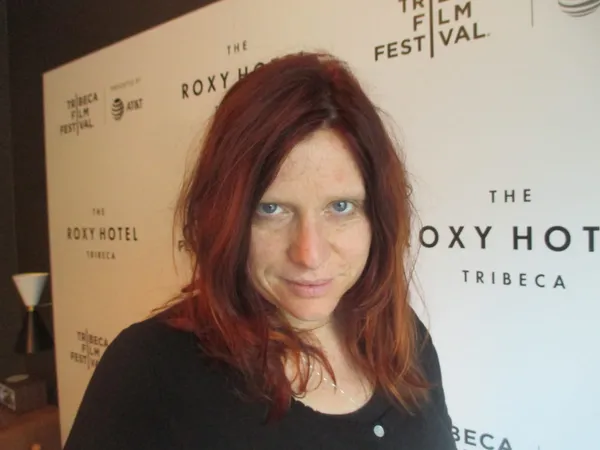Nico, 1988, a highlight of the Tribeca Film Festival and the Best Film Horizons Award winner at the Venice Film Festival, stars Trine Dyrholm (Thomas Vinterberg's The Commune, Festen) as Christa Päffgen. "This is Berlin, my darling, it's burning," says a mother to her daughter. The child is to become Andy Warhol and Velvet Underground icon Nico.
Susanna Nicchiarelli's extraordinary film, shot by Crystel Fournier (Céline Sciamma's Girlhood, Tomboy, Water Lilies) is not about those most famous years (which flash onto the screen in snippets of archival footage), nor, with the exception of a few flashbacks, about her war time and postwar German childhood. In Nico, 1988 the focus is on 1986 and the following years when she was working on her solo career, living in Manchester because, as she says "it reminds me of Berlin after the war in ruins."
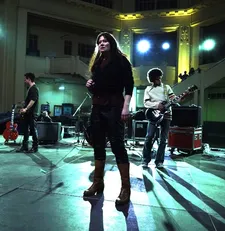 |
| Susanna Nicchiarelli on Trine Dyrholm as Nico: "I never wanted to show the glamour of the rockstar because I don't think it's true." |
Her bluntness and honesty are disarming and Trine Dyrholm gives a fascinating and bold performance in song and words and physicality. A stolen bracelet from Italy (stealing is more fun than getting it as a gift, says Nico), stupid questions at a stupid radio interview, reuniting with her beloved son Ari (Sandor Funtek) on a park bench at a psychiatric hospital.
She comments that "young people are boring", we see her relationship to food and hunger, and multitasking in the bathroom while looking to rent a house (that includes recording the sound of an old boiler and shooting heroin into her ankle).
Nico cannot be easily summed up as so many tried. Her singularity remains, or in the words of Wordsworth: "The marble index of a mind for ever Voyaging through strange seas of Thought, alone."
Anne-Katrin Titze: You have a fabulous beginning for your film. "This is Berlin, my darling, it's burning," the mother says. You show us Nico before she was Nico and after she is Nico, when she is Christa as a child and later in life. How did this decision come about?
Susanna Nicchiarelli: Well, because I think that usually in biopics you're always talking about success and failure and fame and how much a person is famous. And it seems that the lives of these people depend on that, while by studying Nico's character I realised that the important moments in her life, the ones that really marked her character were other things.
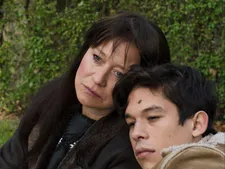 |
| Christa Päffgen (Trine Dyrholm) with her son (Sandor Funtek): "Motherhood was a major thing in her life …" |
Of course being born and having grown up in defeated Germany. Motherhood was a major thing in her life and the way she dealt with it, of course, she wasn't happy about.
AKT: You don't mention Alain Delon by name.
SN: I don't mention him because I don't mention any of the men she was with except Jim Morrison. That was my choice because usually when everybody talks about Nico …
AKT: … they talk about the men.
SN: They talk about men she went with. I think people's lives are much more complex than what movies usually tell us, especially biopics. I made this movie about Nico this way because I wanted to say something about people's lives and human beings and how complicated they are and the fact that it's not only a question of success or failure. Everything that is in the middle between these two extremes is much more important.
The sense of the movie is a little bit in the line that Nico says: "I've been to the top, I've been to the bottom, both places are empty." The point is what goes on in the middle. It's interesting for an artist's life to know that, that an artist's life has many different moments.
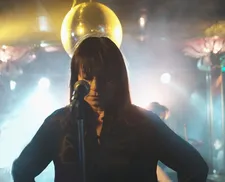 |
| Susanna Nicchiarelli: "The sense of the movie is a little bit in the line that Nico says: 'I've been to the top, I've been to the bottom, both places are empty.'" |
There's also a creative path that the artist takes that has nothing to do with success or in-success, but finding inspiration, your voice, finding your individuality. Like the research she does with her recorder.
AKT: The scene with the recorder in the bathroom is fantastic. She is looking at an apartment in Manchester, she is recording the sounds of the boiler and at the same time she is shooting heroin into her ankle. Your film combines many elements that usually aren't shown together, which makes it so fascinating.
The places you choose to show - the Manchester, which reminds her of Berlin in ruins. In the scenes in Italy there is such a spirit of place, it seems so recognizable. Then she goes East, and even Ibiza at the end where you show us only that gate - how did you pick the places?
SN: My intention was not to look for beauty. Not to make it flashy or glamorous in any way.
AKT: i'm not so sure it worked, because your film is very beautiful, too.
SN: Well, it's a different kind of beauty. My intention was to keep it very simple. That's also why I chose to shoot in that format, square format, because I wanted to stay on the characters.
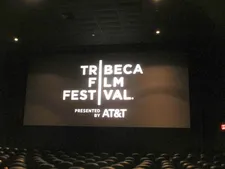 |
| Nico, 1988, a highlight of the Tribeca Film Festival in the Spotlight Narrative program Photo: Anne-Katrin Titze |
I also wanted the film to remind us of the square image, which is the VHS 1980s image. Which we're not used to anymore because even television is rectangular now. I never wanted to show the glamour of the rockstar because I don't think it's true. I think life is much more simple than what we usually see in the movies.
I thought it would be fair to Nico to tell her life without sentimentality, without stressing things too much, but keeping things very simple. For the choice of the locations, that was our criteria too. Simple ideas, simple images.
AKT: Which creates the beauty. Her deadpan "Young people are boring."
SN: I studied the character a lot. I studied her interviews, I knew the lyrics of her songs, and I met all the people that met her in those years. So a lot of things I collected and then most of the sentences she says are either from interviews, things she really said, or things we imagined she would have said.
AKT: The line about the bracelet - "stealing a bracelet is better than getting it as a gift"?
SN: That's true. That's what she said.
Nico, 1988 opens in the US on August 1.








